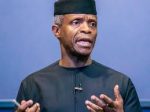We Are Focusing On Auto-Gas As Alternative To Petroleum- Osinbajo
In an effort to offer Nigerians an effective option to petrol, the federal government will focus on developing Compressed Natural Gas otherwise known as auto-gas, which according to him is priced significantly lower than PMS.
Vice President Yemi Osinbajo stated this during a virtual interactive session hosted by the Africa Report magazine on Thursday.
Answering a participant’s questions regarding the removal of petrol subsidy, the vice president said “we have experienced a severe downturn in our finances over the years, so at 60 percent less revenue, we are in a position where sustaining fuel subsidies is practically impossible simply because we do not have the resources.”
According to him, “what we have decided to do is to focus on Compressed Natural Gas (CNG) which is about half the price of petrol today. So, if we use CNG for our cars and for our buses, it will cost between N78 and N80 or so per liter.”
He said under the Nigerian Economic Sustainability Plan (NESP), the Federal Government’s objective is to promote domestic use of CNG and support the creation of 1 million jobs by maximising the domestic use of CNG while reducing reliance on refined petroleum products like kerosene and Premium Motor Spirit (PMS).
‘No plan to hike tax’
Responding to a question regarding increase in taxes, the Vice President noted that the administration has no plans of increasing taxes, stating that “our position really is that, this is hardly the time to raise taxes”.
According to him, “It is even more difficult for people to pay taxes now than ever before, I mean, given the state of affairs, but this is why we’re doing everything now.
“We are trying to ensure that businesses survive this period by providing as much support as we can, and by relieving them of as much burden as possible and ensuring that they are able to get some moratorium so that they can at least continue to run their businesses and by all the other interventions and support that we are giving, we hope that those interventions will help businesses.
“Our approach is first to ensure that we save jobs. If we save jobs and save businesses, and then do the best we can in agriculture, the housing scheme and all of that, we will actually be able to improve spending and if we are able to improve spending, taxes will definitely improve, and if businesses survive, taxes will improve. So, those are the sort of projections that we are looking at.” he noted.










